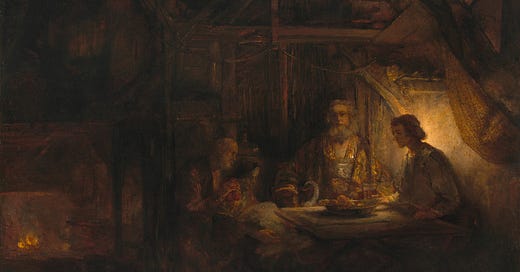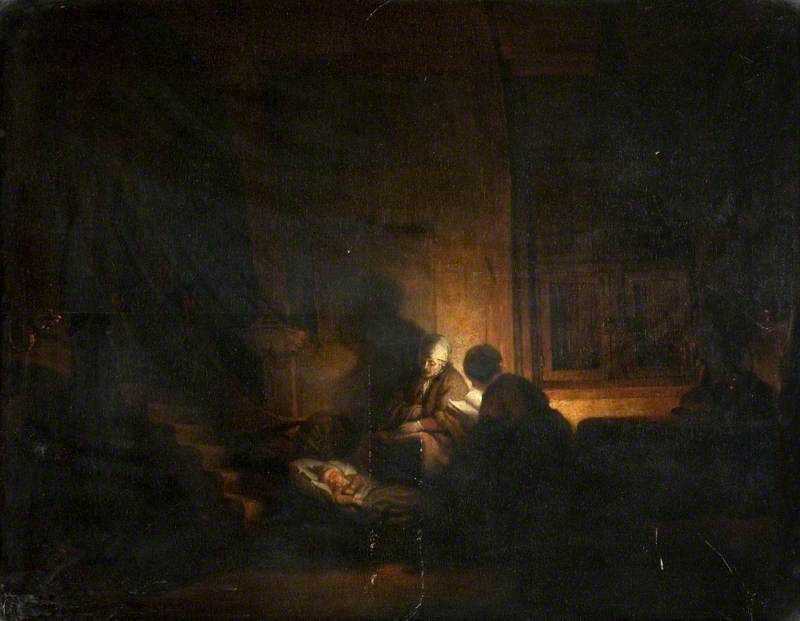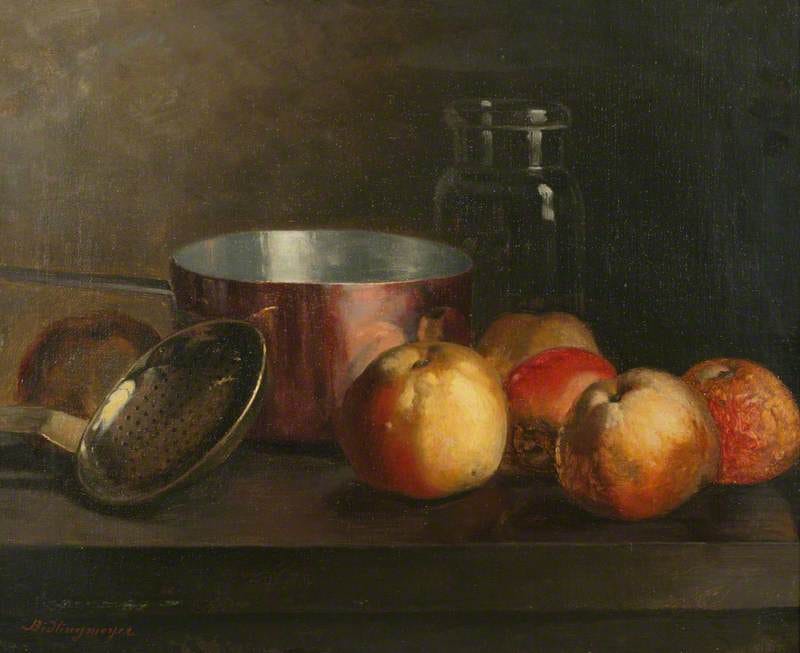In September, I took regular walks along the Thames with my two curly-haired daughters. They stopped to admire every graceful swan, and called affectionately to the mallards who waddled past. It was our first week in the UK, and we knew next to nobody. I felt awkward and timid as we moved about in public; on several such walks, I had to retrace my steps repeatedly in order to find my way home. I experienced similar feelings when I moved from Idaho to Washington, D.C. But living in a new country is, obviously, different: it offers a more pronounced realization of one’s strangeness and ignorance of place. It’s been a wonderful opportunity, however, to think about hospitality from a new perspective.
Living in a completely new place, far from family and friends, has made us more dependent this autumn. I have needed people to graciously explain the bus system, Oxford’s terms and phrases, and where to find half & half, for instance. I am reliant on fellow townspeople’s willingness to practice forbearance, to be gracious with my awkwardness and neediness in this shared space.
We were struck, all autumn, by the welcome and generosity of our new neighbors, and of the church in Oxford. This is the first place in which I’ve lived life with the church on an almost daily basis—thanks in large part to Scriptorium, a gathering of Christians who study and pray together three times a week, and thanks to our church’s vibrant student ministry, which meets weekly in the evenings. Our neighbors, as I’ve noted in a separate Granola post, blessed us before we ever arrived: with coats and clothes for our daughters, food in our fridge, sheets and fresh pillows for our beds, and more. They gave us handmade crocheted Christmas gifts last week. We’ve exchanged baked goods and education ideas and tips (with me primarily on the receiving end).
What could have been an incredibly isolating and lonely thing—moving to a new country—has been a huge blessing. It’s been an opportunity to become vulnerable, and to experience a new kind of dependency as we live as guests here. I’ve been touched by the fact that none of these kind-hearted people seem at all troubled by the fact that we may be gone in a year. It’s quite natural, I think, when the knowledge of short-term closeness is present, to be hesitant in forming friendships. Transience can make us afraid of vulnerability, of opening ourselves up to love, because we know it will hurt when people leave. But our neighbors and church members have been willing to practice kindness and to cultivate friendship for as long as we are here.
In a podcast series on Piranesi this past summer, Joy Clarkson noted that “kindness”—often consigned to the realm of the kitsch or smarmy—is, in fact, a radical practice of creating kinship and combating alienation. “I think kindness is the opposite, or perhaps more appropriately, the antidote to alienation,” Joy suggests. “To be alienated is to be left outside, to be strange and unknown and to experience others as strange and unknown. … We feel trapped outside each other, desperately wanting to be known. We want inside.”
Yet offering welcome to the stranger is difficult (if not impossible) if it’s not paired with a sense of solidarity and awareness of our own strangeness: an acknowledgment of the fact that we have all been outsiders, ourselves in need of comfort and care. We’ve all experienced homesickness, alienation, and loneliness. In Leviticus, God told the Israelites that their new homeland did not ultimately belong to them, but to him; thus their identity in Canaan should remain that of “strangers and sojourners” (Leviticus 25:23). Sojourners were often vulnerable to injustice and exploitation, and were usually associated with the poor, the widow, and the fatherless in the biblical text. To see themselves as strangers and sojourners, Christine Pohl writes in her book Making Room: Recovering Hospitality As a Christian Tradition, the Israelites were required to shape an “alien identity,” one that “provided an experiential basis from which Israelites could know the feelings and needs of sojourners and powerless people living in their midst.” This mandate to identify with the stranger continued in the New Testament, Pohl writes, where “Christians offered hospitality in grateful response to God’s generosity and as an expression of welcome to Christ ‘who for your sake was a stranger.’” In the midst of the stranger’s vulnerability and dependency (states that can foster a sense of timidity, anxiety, or fear), hospitality offers sympathy and fellowship.
Key to that kindness, and thus to hospitality as defined above, is an undergirding belief in the preciousness of every life: a belief that places and people are neither interchangeable nor disposable (in the “throwaway culture” Pope Francis considers in Laudato Si and Charles Camosy explores in his book Resisting Throwaway Culture), but rather irreducibly unique and precious. True welcome suggests a faithful belief in each person’s beauty and worth, even while they are as yet unknown. This idea is present in the writings of Henry David Thoreau, which I’ve been studying this term. In her book Bird Relics, Branka Arsic writes that Thoreau saw every unique instantiation of life as matchless and extraordinary. The chopping down of a tree, death of an aged member of the community, or killing of a fox each represented the loss of a unique, particular life that would never be seen or experienced again—one that irrevocably shaped the local ecosystem by both its presence and its absence. Thoreau’s philosophy thus cultivated a radically communal view of life’s interdependency. I appreciate his call to notice and celebrate the unique beauty of every living thing, and to be intentional about practicing attentive kindness to the world around us. It seems to fit well within the “culture of encounter” Pope Francis suggests is essential to fostering new practices of fellowship and care.
I’ve spent most of my life in places where I’ve been relatively independent. In the U.S., I’ve had a car (or easy access to a car) and a comforting knowledge of local infrastructure, brands, terms, and more. Here, in a very limited and privileged fashion, I’ve seen a bit more how it feels to be a needy guest, dependent on the welcome and the kindness of strangers. My family and I are fortunate to have remarkably kind neighbors and to have, as Christians, access to the associational vibrancy of the church. But not all churches practice hospitality to strangers—indeed, they can at times make newcomers feel like outsiders, and strangers feel like enemies. The demand of the Scriptures is clear, but Christians often fall short (and I include myself in this). It’s been an immense blessing—and an opportunity for conviction and challenge—to live in a place where members of the church embrace the call to welcome wholeheartedly, seeking to embody a radical form of hospitality in which all newcomers are welcome, no matter how long or short their stay. Moving to a new country and meeting dozens of new people every day, I’ve been struck by the call to that acknowledgment of preciousness Thoreau sought to describe: in which we offer solidarity and support to strangers, and take seriously the call to grateful interdependence.
When I return to the U.S. from here, I hope to become more intentional about welcome and hospitality—to display neighborliness like that which we’ve experienced here through our neighbors and fellow church members. I’ve been thinking a lot about Charles Camosy’s definition of a true “culture of encounter,” which, he writes, must give special thought and care “to the peripheries where we can encounter the excluded and the marginalized.” Ultimately, hospitality has important political implications, as Tara Isabella Burton wrote earlier this year: hospitality is “an obligation we have, as hosts, not because of anything we might get in return, but simply because what we have (our property, our privilege) does not actually belong to us. We might say that hospitality culture correctly identifies whom the securities of the world belong to: all who need them. It understands the universal destination of goods.”
As we were leaving the U.S. in September of last year, we saw many Afghan refugees at the Dulles airport—people experiencing the tragic injustices of displacement and violence. This winter, the Washington Post reports, many refugees are underserved as case officers in the Washington region struggle to keep up with the needs of Afghan evacuees. One way to partner in such efforts is to support World Relief, which has helped to welcome 1,000 Afghan evacuees from Kabul since August 2021. I hope 2022 might challenge us to foster a culture of encounter that reshapes our habits and practices in profound ways, and reaffirms our commitment to radical kindness and welcome.
After all, we are all “wayfaring strangers,” as Burton notes: “we are none of us in a land that is ours to keep.”
Email me your thoughts on kindness, hospitality, and cultivating a “culture of encounter,” or share them in the comments below! I’d love to read, and share, your input.
favorite articles & essays of 2021
Jennifer Banks on mortality and natality: “Because we were all born, Arendt believed, we are always all capable of beginning again, of starting something new through each human action, the most prized of capabilities in Arendt’s estimation. Philosophers and theologians have long stressed that we are mortal creatures, but Arendt emphasized that we are also natal creatures. ‘Men, though they must die,’ she wrote in The Human Condition, ‘are not born in order to die but in order to begin.’”
Justin Giboney on biblical peacemaking: “Biblical peace is shalom, meaning completeness, well-being, and right relationship with God and each other. Silence or inaction amid grave partiality and inequality is not peace. When we mute the poor or rob the victim of voice, we deny peace.”
Benya Kraus and Nathan Beacom on loving place and people: “What has brought us home—and brought us together—is a shared dedication to things stronger and older than ideology, like community, home, and faith. Integral to these things is a deep belief in the sacredness of each human being and the places to which they belong.”
Jennifer Moore’s exploration of rural folk music’s fragile beauty for the New York Times: “The McClurg old-time fiddlers and banjo players have mostly learned the tunes by listening to one another rather than reading from sheet music, passing the tradition from one generation to the next. … The internet has guaranteed that many of the songs will endure. It's the stories behind the songs and institutional knowledge that will disappear if jams like McClurg cease to exist.”
Michael Sacasas’s “Ill With Want,” “The Paradox of Control,” “Your Attention Is Not a Resource,” and “What Did We Lose When We Lost the Stars?”
This investigative piece by Austin Frerick and Charlie Mitchell for Vox: “Iowans living in confinement-dense areas have complained about the air quality being too poor for their kids to play outside; the clouds of flies attracted to the giant manure pits and lagoons; the exploding population of rats, drawn by the vast stocks of animal feed, that infest homes; and the vultures that snatch discarded carcasses from CAFO dumpsters, then drop pig parts in backyards.”
Anne Helen Peterson on the “quasi-commune” and the perils of convenience: “Existences many of us understand as the height of privilege — to live absolutely alone, and thus have utter mastery over one’s choices, or to live just with a partner who does not significantly challenge those choices — have revealed themselves as vulnerabilities. We spend so much time wishing for dominion over our own spaces and lives and forget just how lonely it can be once we arrive there.”
Anthony Barr on racial justice, evangelicalism, and the prophetic work of peacemaking: “Jesus has placed his body between our bodies and the world. It is the nexus where suffering meets grace, where oppression gives way to radical self-emptying.”
John Miller’s call for a reinvigoration of local journalism: “To trust the work of journalists they don’t know, Americans need to see journalists they do know making phone calls, knocking on doors and printing corrections when they screw up.”
Meghan O’Gieblyn on routine maintenance: “Unlike algorithms, which lock in patterns and remain beyond our understanding, habits allow us to negotiate a livable equilibrium between thought and action, maintaining, as Weil puts it, ‘a certain balance between the mind and the object to which it is being applied.’”
Leah Libresco Sargeant on the suffering of the body: “Our bodies are a brute fact. The immediacy of a sprained ankle is an aching interruption to our routines, our sleep, our thoughts. Chronic fatigue poses a constant question: If I do this, how will I pay for it later? But to get help from others, we have to find a way to cry out so that our neighbor will hear us.”
Tish Harrison Warren on being pro-life, Dorothy Day, and political polarization.
Paul Kingsnorth on Simone Weil: “Her attachment was to the eternal things, and she could never be boxed in. She wrote in praise of God, tradition, roots, peoples and culture; but also of justice, freedom of speech and thought, honour and equality.”
book list 2021
I read approximately 65 books this past year. Sharing some of my favorites below!
books on agriculture, nature, and place
English Pastoral, James Rebanks
Farm (and Other F Words), Sarah Mock
Landmarks, Robert MacFarlane
Up to Heaven and Down to Hell, Colin Jerolmack
fiction
The Round House, Louise Erdrich
House Made of Dawn, N. Scott Momaday
Hannah Coulter, Wendell Berry
The Last Samurai, Helen DeWitt
The Lord of the Rings, J.R.R. Tolkien
Pushing the Bear, Diane Glancy
poetry
Perfect Black, Crystal Wilkinson
Everyman Poetry, R.S. Thomas
The Essential Gwendolyn Brooks, Gwendolyn Brooks
Word in the Wilderness: A Poem a Day for Lent and Easter, Malcolm Guite
Tessa Carman’s “In Memory of Mary Oliver”
nonfiction
Incidents in the Life of a Slave Girl, Harriet Jacobs
Reading the Times: A Literary and Theological Inquiry Into the News, Jeffrey Bilbro
The Christian Imagination: Theology and the Origins of Race, Willie Jennings
Henry David Thoreau: A Life, Laura Dassow Walls
food
We made this mushroom risotto last week, and it disappeared quickly! Risotto is one of my favorite dishes, but we rarely make it… perhaps I should make a new year’s resolution to eat more risotto?
We’ve gotten tons of leeks in our farm deliveries this winter, and are always looking for new recipes and ways of eating them. I’m hoping to make this one-pot french onion soup—which uses leeks—later this week. I made this pea and leek tart this weekend, and it’s wonderful (as all things with heavy cream, butter, and cheese generally are). It would be fun to try it with puff pastry.
I’m planning to make Mary Berry’s amazing poussins with an orange, sage, and ginger marinade (with a normal roast chicken) with roasted potatoes and carrots this evening.
This is my favorite (crazy simple and vegan) cauliflower soup recipe.
A fantastic, simple soda bread recipe we’ve used several times of late.
listening
ICYMI, I got to help put together a podcast about synesthesia this year, and it’s on Spotify! If you listen to it, I’d love to hear your thoughts. (And would love to hear your stories about synesthesia, if you have it.)
This is your annual reminder that Thomas Newman’s “Little Women” soundtrack is one of the most beautiful soundtracks of all time.
One year ago: “Embracing Risk in 2021.”
Two years ago: “A Decade Past.”






I always wonder how some people are able to read so many books in a year, especially with young children! Do you happen to have any tips or techniques for reading, or recommendations on guides to reading e.g. Mortimer Adler? I have an infant child myself, so free time is scarce.
Totally agree with you about Thomas Newman's Little Women soundtrack. The beginning track is so American with its brass notes -- yet an undercurrent of gravity. Then, there's the music that accompanies the scene after Beth's death where the housekeeper (Hannah, I think) places the dolls on the bed and scatters blossoms. So poignant! I think the music is one reason (and the absence of that scene) is why I do not prefer Greta Gerwig's Little Women. You've given me a lot to think about in this post as my hometown in Indiana has lately lost several women like Hannah Coulter who were part of my history there in that place.